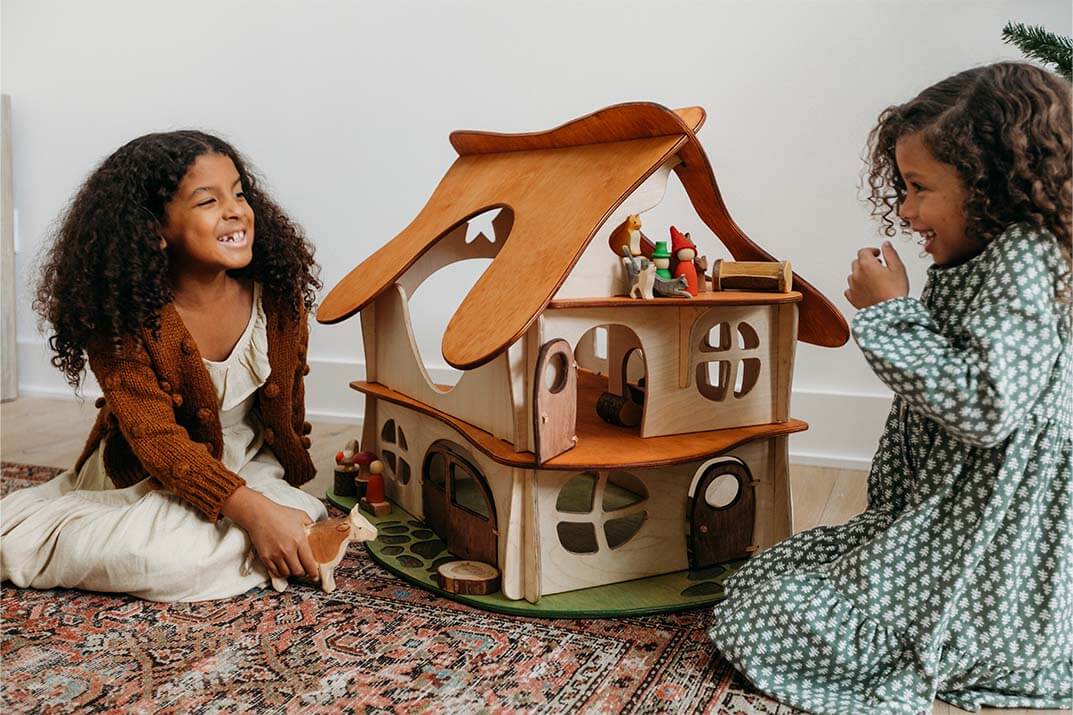There is nothing quite as magical and deeply nurturing as singing to your infant and children. But often times, we carry the false assumption that we don't have a good enough voice or we feel shy or hesitant when we sing. But here’s the truth: your child loves your voice. In fact, hearing it is developmentally essential.
Today on the blog, we’re thrilled to welcome renowned voice coach and Waldorf-trained music educator Shannon Boyce of A Supple Voice. Shannon shares her gentle wisdom and practical tips on how singing with your children can build deep connection and profoundly support their well-being.

Your Voice Is the Lullaby: Singing as Soul-Nourishment for You and Your Child
By Shannon Boyce, A Supple Voice
Some of the most sacred moments of my life didn’t happen on stage or in rehearsal—but in the quiet of a dimly lit nursery, rocking my baby in my arms and singing a simple lullaby. No audience. No performance. Just breath, love, and presence. Before I had children, I believed singing was something I did. After becoming a mother, I understood that singing was something I am.
As parents, we are constantly giving—caring, guiding, preparing. But in those quiet moments, a song may rise within you. Perhaps it’s a melody your grandmother used to hum, or a tune that seems to spill out as you rock your child. This isn’t a performance. It’s instinct. And it’s sacred.
In Waldorf education, we speak of the etheric body—the life forces that help us grow and thrive. Singing is one of the most beautiful ways to nourish this life force—not only in our children, but in ourselves. It’s not just an artistic act. It’s a way of living. A bridge between your inner being and your child’s world. A way of harmonizing your breath, your body, and your soul with the child you love.
The Earliest Bond
Did you know that babies can identify familiar voices—including yours—before they’re even born? Hearing is the first sense to develop in the womb. The watery environment of pregnancy actually enhances the perception of sound, because sound travels faster and more efficiently in water than in air due to water’s density and low compressibility.
Singing while pregnant isn’t just soothing for the mother; it also stimulates and comforts the baby, laying the foundation for bonding through the vibration and rhythm of your living voice.
Why Your Voice Matters More Than a Recording
In our modern world, we often outsource music—turning on Mozart playlists, pressing play on baby apps, or leaving a music box humming in the nursery. But something extraordinary happens when a parent sings live to their child. The voice becomes a bridge between your inner life and your child’s world. It says, I’m here. I see you. I love you.
Research backs this up. Shannon de l’Etoile, professor of music therapy at the University of Miami, discovered that infants show greater engagement when listening to their mother’s singing than to recorded music or even reading to the child. As mothers instinctively adjust pitch and tempo to respond to their baby’s cues, the interaction becomes a dynamic emotional exchange.
Another study from Yale University found that singing improves infants’ moods and increases emotional bonding. Singing even releases oxytocin—the same hormone that flows during breastfeeding—nurturing both connection and well-being. In short: no recording can replace your voice. Not Mozart through a belly speaker. Not a lullaby playlist. You are the music your child craves.
But What If Singing Feels Hard?
Many parents carry quiet wounds around their voice. Maybe someone once told you not to sing. Maybe it feels awkward, tight, or unfamiliar. Add the fatigue and tension of daily parenting, and singing can feel like just one more thing you can’t quite reach. But here’s the truth: your voice is still in you. It’s not broken. It’s just been waiting—gently—for permission to return.
Singing isn’t about perfection. It’s about presence. It’s not about “getting it right”—it’s about allowing something natural to move through you. Even if your voice feels shaky or small, even if it catches in your throat, there is a path back—to softness, to freedom, to flow. This isn’t about being a “singer.” It’s about discovering the quiet miracle of breath and sound as a living expression of your love.
Singing Is Not Just for Your Child—It’s for You, Too
There’s a moment—if you let it—when singing opens something in you. Not because you’re performing, but because your breath begins to move freely again. Most of us don’t realize how often we hold our breath. We live in a world that rushes, worries, and pulls us out of ourselves. But singing gently brings us back. It reconnects us to the river of life within us. Not in a grand performance, but in the quiet act of humming while folding laundry… Or singing during bath time… Or whispering a lullaby as your child drifts to sleep.
At A Supple Voice, I teach that a natural voice lives between a supple body and a supple soul. When we sing from that place—not pushing, not performing, just allowing—we tap into something deeply human and profoundly healing.
You are both the instrument and the one who plays it. Let your child hear the song that lives in you. And let yourself feel its warmth, too.
A Family Culture That Lasts
In my own home, even though my children are now 21 and 18, we still sing a blessing at the table when we’re together for a meal. It’s a small moment, but it keeps a thread of presence and love running through our family life.
Singing isn’t just for babies—it’s a practice that roots us, connects us, and can grow with us through every stage of life. If you’d like to begin—or deepen—a culture of singing in your home, visit www.asupplevoice.com/forcaregivers Let this be your beginning. Not to perform. Not to impress. But to enliven—your breath, your voice, and your whole self.
Because when you awaken your breath and free your voice, you don’t just make sound— you become more alive. And your child feels that aliveness. They receive your presence, your warmth, and your being – through your song. Your voice is the lullaby. Let it be heard.





























Leave a comment